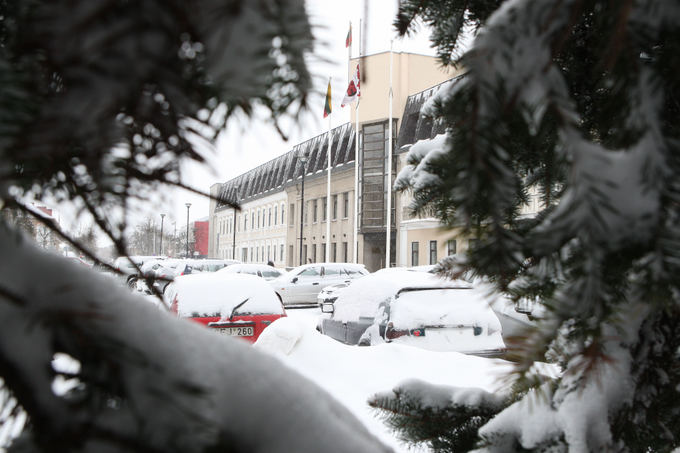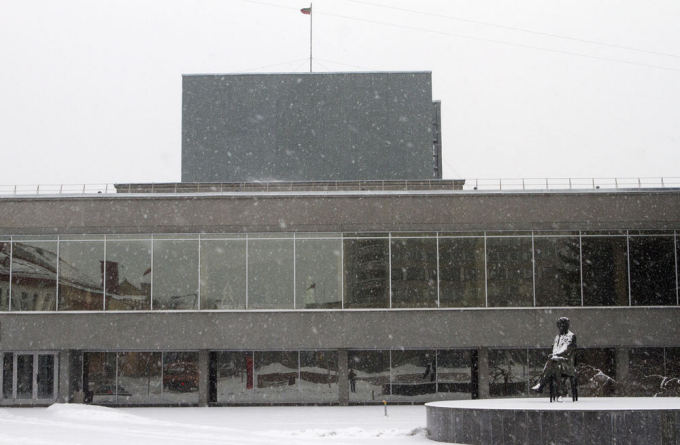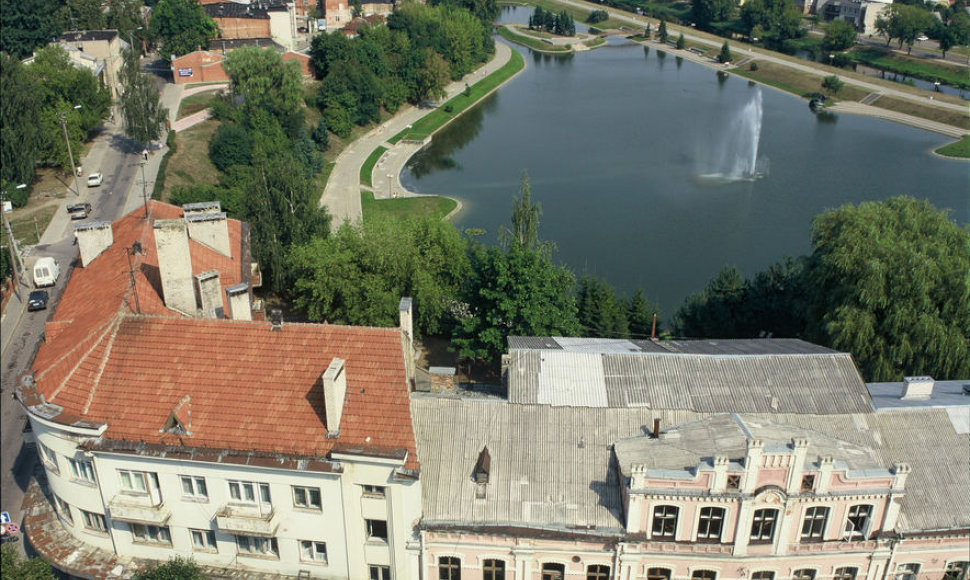If one looks at figures alone, Panevėžys does not seem like a bad place to live. The average pay is only slightly below the national average. The town houses many companies with workforce of over 250. The Lithuanian Free Market Institute ranked it number three among Lithuania's municipalities.
But judging by what citizens themselves say, one might get the impression that life in Panevėžys is worse than elsewhere. And it sometimes takes an outsider to help locals appreciate their own town.
Norwegians like Panevėžys
“Let me paraphrase the words by John F. Kennedy: Do not ask what Panevėžys can give you; ask what you can give Panevėžys,” Per Erik Schonberg-Hansen, president of the Foreign Investors Business Association, said at a debate organized by the European Commission agency and added: “You must be proud of being from Panevėžys and not wonder in surprise why foreigners choose to come to this town.”
 |
| Per Erik Schonberg-Hansen |
Panevėžys is turning into a Mecca for Norwegian investors. There are 19 Norwegian capital companies operating in the town, including banks. The companies employ around 1,200 people and most of the investment came over the last five years. Norwegians also run the F.I.B.A. (Foreign Investors Business Association of Panevėžys).
Schonberg-Hansen says one of the reasons for Norwegian entrepreneurs settling in Panevėžys is that they find it easy to do business with the municipal authorities of the town and the district. A good geographical location is also a bonus. The Norwegian warns, however, that if the town wants to attract even more foreign investment, it must step up its professionalism – investors prefer to get responses at once and not in a week or a month.
The F.I.B.A. president is surprised by local businesspeople and officials who keep complaining and asking for state support: “In my opinion, one should not look for subsidies, but for opportunities to create things for oneself.”
Greatest obstacle – shadow economy
The Lithuanian Free Market Institute, that has analysed situation in Lithuania's municipalities, believes that social security is the weakest area in the running of Panevėžys.
The relatively high unemployment rate is named a point of concern. On 1 February, unemployment in Panevėžys region was 13.9 percent. Over a third were long-term unemployed.
One year ago, there were 86.9 receivers of social benefits per thousand people in Panevėžys (national average is 69.1). Just like the rest of the country, Panevėžys is locked in a vicious circle: unemployment benefits make receivers reluctant to take up low-paid jobs.
Sigitas Gailiūnas, president of Panevėžys Chamber of Commerce, Industry, and Trade, believes that cheap labour is what makes the town attractive to foreign investors: “There are companies that operate in Panevėžys only because of the low pay. Once labour costs go up, they'll move to cheaper countries.”
Jonas Klybas, director of Norwegian capital company Adax, disagrees: “Panevėžys was a region of cheap labour some 5-10 years ago. Now, it needs skilled workers, too.”
The town is mostly in need of managers, administrators, accountants, insurance agents, kinesitherapists, nurses, and social work assistants. There is a shortage of sellers, cooks, bakers, confectioners, tailors, shippers, construction workers, security workers, machinists, welders, and carpenters.
CEO of Investors Forum Rūta Skyrienė tells 15min that according to Panevėžys entrepreneurs she has spoken to, the biggest problem in the town is shadow economy: “Most of the business is done in the shadow.”
Businesspeople themselves estimate that shadow economy involves as much as 60 percent of all businesses.
Skyrienė agrees that shadow economy might account for the relatively high unemployment rate in Panevėžys region.
Too much investment
“Panevėžys has retained its image as an industrial town – except that the big industry it had twenty years ago is gone. Panevėžys now houses mid-scale companies, both new and old,” says town mayor Vitalijus Satkevičius.
 |
| Panevėžys Mayor Vitalijus Satkevičius |
The mayor believes that it might have been the Norwegian capital that helped Panevėžys land number three spot on the Free Market Institute ranking. He adds, though, that the town also boasts homegrown companies like road builder Klaipėdos Keliai, Lietkabelis, dairy plant Panevėžio Pienas, Panevėžys Building Trust, and Kalnapilis brewery.
The mayor regrets that TV set maker Ekranas and a meat processing plant have closed down.
Satkevičius assures that Panevėžys welcomes all investment, but adds that there are challenges, too. In order for various projects to be implemented, the town municipality must contribute its own funds, at least 15 percent.
“We cannot handle all the investment that comes to Panevėžys, just like other municipalities. Debt grows and needs to be repaid. By joining investment projects, we shackle ourselves and we cannot mend streets, take care of the way the town looks, even to mow the lawns – and all this also contributes to investment environment,” the mayor says.
Sparkling houses on bumpy roads
Panevėžys still has not fully recovered from the 2008 economic crisis. Signs of the downturn are evident on the streets. It has been a while since the town carried out major infrastructural reconstruction – in the 1980s.
“Streets are in worse condition every year, but the town coffers can hardly scrape for hole mending – we can only dream of a major repair. Due to a drop in budget revenue, the authorities will have to make some unpopular decisions – including cuts in education and culture,” mayor Satkevičius regrets.
Asked if there are things that are going well in the town, he grins: “Panevėžys is leading in renovation of blocks of flats.”
Since 2000, town citizens have been making contributions to savings accounts and use the funds to renovate old Soviet-built blocks of flats. There are about 815 of those in Panevėžys. As long as the state offered to cover fifty percent of renovation costs, residents' associations willingly renovated the houses.
 |
| Panevėžys |
Different fates of industrial parks
81 percent of companies in Panevėžys are small businesses. Last year, over 100 new firms were set up. Panevėžys Business Consulting Centre president Akvilė Ramanauskienė believes that some of the new businesses were set up out of desperation. Many of such firms close down by dozens each year – perhaps due to inexperience and lack of skill to run a business.
Panevėžio Keliai (Panevėžys Roads) is the biggest employer in town – it has a workforce of 699. Lietkabelis is close behind with 596. Panevėžio Energija (Panevėžys Energy) employs 553 workers, Dominari, 547, AQ Wiring Systems, 540, and Panevėžys Building Trust, 535.
Povilas Žagunis, mayor of Panevėžys District, claims that local authorities have done all in their power to create more jobs – they prepared general development plans, have invited investors to come.
Panevėžys Town Municipality is currently implementing a marketing project for Panevėžys Industrial Park (free economic zone). Investors are offered a territory of 47 hectares with full infrastructure.
The Municipality has already signed four contracts with potential investors who promise to create 600 jobs. So far, only one company, Devold, is working on designs, while the others have registered tenancy contracts at the Register Office.
“We hope that the free economic zone development will gather speed once we find an operator,” Satkevičius says.
Panevėžys District Municipality hoped to repeat the success a few years ago, when it made a 15-million-litas (4.3 million euros) investment into Ramygala Industry Park. Most of the investment came from EU funds. However, the projects proved to be a disappointment. One of its “investors” – a local farmer who grows potatoes in the territory.
“The geographic location is perfect, all necessary infrastructure is in place, Via Baltica highway runs right besides – I cannot understand why Ramygala project failed. We had one investor (Austria's ASP-BEDD Productions) but it ran away,” district mayor Žagunis regrets.
Not a city any more?
Over the last decade, Panvėžys lost almost 18 percent of its population, Panevėžys District – over 10 percent. Because of the drop, Panevėžys came close to losing its official status as one of the five major cities of Lithuania – it had fewer than 100 thousand residents.
In January, however, the central government approved the general plan of Panevėžys County, where Panevėžys retains its status as a major urban centre. The Panevėžys Metropolitan Zone includes both the town and district of Panevėžys.
Corruption
Panevėžys is notorious for its corruption scandals.
In November 2009, town deputy-mayor Kastytis Vainauskas and municipal administration head Stasys Karčinskas were arrested for taking bribes from businesspeople in exchange for construction permits.
Soon afterwards, another deputy-mayor, Zita Kukuraitienė, was accused of abusing her office in handling public transport competitions.
Over the last several years, the Special Investigations Service have brought charges of bribery, abuse of office, or document forgery against former administration director Buterlevičius, council members Tomas Tarulis and Gintaras Byčius, former mayor Visvaldas Matkevičius, and former council member Vidas Balakauskas. The latter was acquitted due to lack of evidence.
A number of cases against former and current members of Panevėžys administration are still pending.
Artistic scandals
Juozas Miltinis Drama Theatre, that used to bring fame to Panevėžys, is drowning in scandals, too.
In 2010, actors rose against Rimantas Teresas, a long-time director of the theatre company. He was replaced by actor Laimutis Sėdžius who did not last for more than two days. Stage Director Romualdas Vikšraitis was then hired to run the company, but actors have rebelled against him, too.
Vikšraitis was publicly accused of incompetence, inability to perform his duties, and tyranny. In reply, he said actors in the company were all drunkards. Some of them were subsequently fired for truancy, including former company director Teresas. A court later ordered to reinstate him.
Former Minister of Culture Arūnas Gelūnas, weary of the controversies, offered that Panevėžys Municipality take over the national theatre company. The Municipality rejected the offer, saying it was unable to support a company of such stature.
“Calling it legendary is no longer justified, it has been a while that the quality of its productions is a far cry from those of Juozas Miltinis; the name is all that remains of the theatre company,” Minister Gelūnas commented on his motion.
 |
| Vytauto Valentinavičiaus nuotr./Juozas Miltinis Drama Theatre |












